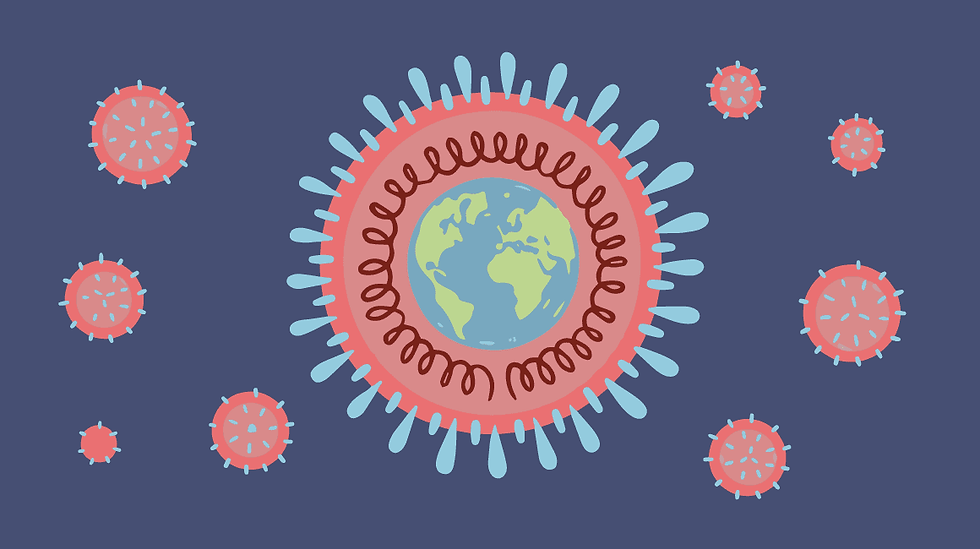Teens in Lockdown
- Ruby Bishop

- May 4, 2020
- 6 min read
Updated: Dec 22, 2024

"In the last 5 weeks I’ve noticed my own anxiety rising. Because, like a lot of kids, I didn’t get to take my exams, so I’m waiting for my predicted school grades. I’m missing not being able to meet up with my friends and I’m also worried about everyone who is at risk of getting COVID-19, including my grandparents." Ruby Bishop shares her own experiences of lockdown, and interviews her peers to learn more about how they are coping.
Lockdown is disrupting the daily lives of everyone across the globe and teenagers are adjusting to a shift in their educational, social and personal lives. Since Covid-19 arrived in the UK in January, the country went into national ‘lockdown’ and school was closed for many kids globally. The school year abruptly came to an end, with exams and proms being cancelled, while socialising has ground to halt.
Social distancing is a necessary measure for society, but, with no planned end in sight, there is certainly a general air of low mood among teens, who thrive on social connections. Although social media is definitely playing its part in filling in the gaps, it certainly isn't the same as meeting up with friends, or playing team sports.
A New York-based psychiatrist, Zlatin Ivanov, MD warns of the harmful effects of social distancing, noting: "All our systems, including social, psychological and biological, have developed around social groups and interaction with one another. Social isolation in most cases would bring the negative effect of loneliness, anxiety and sometimes depression." In addition, Ivanov says the effects of isolation get worse with time, as he recognises: "The longer the period of isolation, the more likely it becomes for the individual to show signs of anxiety, loneliness, and depression and other mental afflictions." Worryingly, in March, the Guardian reported that 60% of people have felt anxious about the pandemic, while the World Health Organization have advised against watching the news if it is heightening stress levels.
The following interviews have been conducted amongst 15 and 16 year olds, all of whom have, in varying ways, been affected by the outbreak. While many are not concerned about their own physical wellbeing, they do express fears over the potential effects of COVID-19 on more vulnerable members of society.
“I’m not too worried about the coronavirus”
"I’ve created my own timetable to follow. In the morning, I have been doing a daily workout by Joe Wicks, which makes me feel like I'm doing something other than sitting around all day. I have also been completing my coursework for my A-levels and attempting to learn some more complicated songs on my keyboard.
Although I do consider myself to be a sociable person, the lockdown isn't too bad. I am still keeping active and have done a few arts and crafts. Being in quarantine has also given me time to do things I don't usually have time to do, like sort out some of my old paperwork and clean my room. I'm not too worried about the coronavirus, as I appreciate the fact that the lockdown is going to help contain it. I was worried when I first heard about it being in my local town but I know that I have a good immune system, and will hopefully be alright. It has been challenging not going to the beach or going on holiday though!" - Kim
“The challenge is for me is trying to stay in doors and keep myself busy”
"To pass time, I've been studying trying to keep up with school work so I'm ready for when we go back. I have also been doing a lot of exercise to keep fit, because I'm always indoors. The one thing I've found difficult is not being able to see friends and family. It's been 7 weeks for me, and I find that staying in doors and keeping myself busy is very challenging!" - Bobbie
"I miss being able to see my friends"
I’ve been painting, participating in family activities like cooking food and baking. I’ve also occasionally been doing chores like ironing and re-decorating the house.
The thing I’ve found most difficult about being in quarantine is not being able to see my friends. Lately, I've been feeling very frustrated, and, as I have ADHD, I’m finding social distancing and being in quarantine extremely difficult! I hate being cooped up at home, and not knowing how long we’ll have to remain in quarantine makes it even worse for me. Lately, I’ve just felt like I was going to lose my temper, which I’ve done multiple times towards my mum and dad, who weren’t best pleased.
I’m concerned about the amount of lives COVID-19 has taken. The increasing deaths and number of cases makes me think that this disease hasn’t even reached its peak yet, and that this is only phase 1. However, after quarantine, there will be the struggle of the economy trying to build itself backup again with everyone absent from work, and meeting up in smaller groups than before. In my opinion, after this pandemic, nothing will really be the same: there will be limited things that we are allowed to do, and these will change over time." - Olivia
“I have found the lack of freedom challenging”
"I have been doing school work, and been going on walks everyday as my 1 exercise a day. I have found not seeing my friends difficult, as we would see each other everyday at school, and on most weekends. I have found the lack of freedom very challenging!
My concerns are that people are not taking it seriously enough, or abiding by the rules set by the government. This means more vulnerable people could get sick with the virus, and, in turn, the lockdown could be extended. - Ben
“Not seeing people is difficult, as I rely on my friends to keep me sane”
"To pass the time, I have been on my phone or doing my makeup. I've been trying different makeup looks as well as watching TikTok videos. I have found not talking or seeing many people difficult, as I rely on my friends to keep me sane.
I am concerned about catching the Coronavirus in case I give it to my mum, as she’s in the high-risk category." - Ellie
"The fact that we cannot see friends and family is tough for everyone”
I try to keep myself occupied, whether it's watching Netflix or going for a walk/run.
Considering I've got all of this time on my hands, I should perhaps learn a new skill that could be useful in the future. I'm not concerned about my health regarding the coronavirus, because, apparently, it isn't that bad for younger people. However, I am concerned for the older people that could have it, and anyone else in the "high risk" category. I believe that it was the right decision to close schools. Although the thought of not seeing my friends was quite scary, I do understand why they closed them, as the virus is causing so much harm. The fact that we cannot see friends and family is tough for everyone; I’m very thankful for video calling!" - James
After reading these responses, it is clear that teenagers should not feel alone in their feelings about the pandemic. Studies agree that social distancing and isolation can result in a range of symptoms, including: anxiety, stress, irritability and having a low mood. These interviews prove that teenagers definitely fit such trends.
While some of the interviewees are concerned about the health of their family members who may be in a high risk category, they are also struggling to stay occupied, and there is a lot of uncertainty with how long we will be in lockdown for. One teenager describes how hard it is having ADHD and how it’s hard for her to regulate her emotions and stay upbeat. However, although these teenagers are finding the change in lifestyle challenging, they have been finding ways to keep themselves occupied during the lockdown.
Ruby Bishop can be found on Instagram at @rubysbookblog
#coronavirus #covid19 #pandemic #breakingnews #currentaffairs #teenagers #lockdown #selfisolation #quarantine #interview #facts #teenjournalism #uk #internationalnews #journalism #teenwriter

_edited.png)



Comments